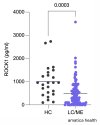neophyte32
Established Member (Voting Rights)
Hello, I'm not a scientist, but I've been suffering from severe MECFS for 3 years. I know that Amatica Health has been criticized a bit here (formulation, lack of scientific rigor according to some, control population, etc.), but I wanted to see the protein marker levels with them. Okay, the control population is too small to have real scientific evidence, but I was surprised to find a 0 for the Rock1 protein (Rock2 was present, but at a rather low percentile). In more than a third of the 60 people tested, Rock1 values of 0 or close to 0 were found. What does this mean to you? I'm a novice, and isn't it definitive to have Rock1 at 0? Thank you for your opinions. Yours faithfully,

